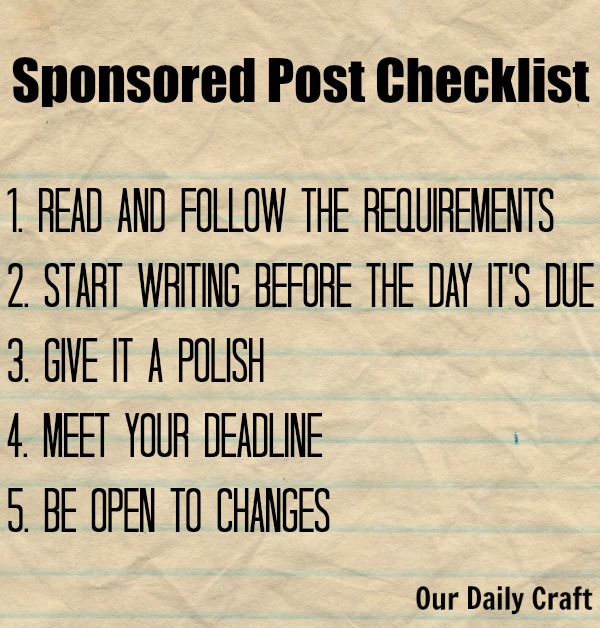Affiliate links may be included for your convenience. View our privacy and affiliates policy for details.
There’s been a lot of talk lately in my little corner of the blogging world about professionalism and being a writer versus being a blogger versus being more of a reporter or writing for the web from a news perspective.
While it’s certainly fine to give yourself any of these labels — or storyteller, family life documenter, whatever you want to call what you do — when money comes into it in the form of a sponsored post or writing content for someone else’s blog, you’re operating on a whole different level. 
If you’re new to the world of sponsored posts or want to know what you’re getting into before you get started — or you’ve done a few but want to make them even better — here are some things you can do to ensure that your sponsored post clients will love working with you and want you for assignments whenever possible.
Note: this post is about what to do after you get the assignment. Hopefully soon I can share some tips on landing sponsored posts as well.
1. Read and Follow the Requirements
Whether you’re posting a sponsored post on your own blog or writing for someone else’s website, there are going to be certain rules you have to follow. They’re going to have standards they want you to follow around things like
- word count
- number and size of photos
- tone/style
- mentions of keywords/talking points (sometimes)
- deadlines
You need to know all this going in to make sure you can meet their needs, and you need to refer to the information you’re given at the start of the project to make sure you do everything they asked.
2. Start Writing Before the Day it’s Due
You don’t always get huge lead time with sponsored posts (I’ve had them range from a day to a month or so), but you owe it to your client and to yourself not to do the bulk of the work right on deadline.
If you have to make a recipe or a craft, do that ahead of time to make sure it works. Start outlining and writing a few days ahead of your due date if you can so that it can sit for a day before you edit and send.
Of course, you don’t have to wait until the day it’s due to turn it in, either, unless it’s for your own site and needs to be published on a certain day.
[Tweet “Writing a sponsored post? Don’t wait until the day it’s due to get started.”]
3. Give it a Polish
Having that space and time away from the post makes it a lot easier to edit. Now’s the time to look at grammar, spelling and sentence structure to make sure the piece flows. (Here are some of my favorite editing tips.)
It’s time to look back at those requirements and make sure you’ve done everything you were supposed to do. Make sure that photos are formatted and sized, that your text is in the right format, that links are showing the way they’re supposed to and that they are correct.
Now’s a good time to think about tone, too. Does your style meld with that of others posted on that site? Are you presenting yourself and the product or company you’re writing about in a professional manner?
You don’t have to lose yourself when you write sponsored posts, but you do need to keep the audience — which is a little different from your regular blog audience — in mind. 
4. Meet Your Deadline
As mentioned above, in some cases it might be possible for you to turn things in early, but at the very least turn your work in (or hit publish) by the agreed upon time. Nothing will get clients to turn away from you faster than not keeping your commitments.
If you can stand me saying it again, go back to the original assignment and make extra sure you’re delivering what you said you would, how and when you said you would. You have no idea how following the instructions sets you apart.
5. Be Open to Changes
The vast majority of the time your pieces will probably get published pretty much as written, but if the client comes back and as for changes or follows up in any way, respond quickly and cheerfully.
Don’t be defensive, just fix the problem. Even if you don’t agree there is a problem.
The client is the one who needs to be the happiest in this situation, especially if you want to work with them again, so do what you need to do to make that happen.
Do you have any more tips for working with clients or doing sponsored posts? I’d love to hear your thoughts!



5 Comments
Another great set of tips, Sarah! Thank you for sharing your wisdom and experience. 🙂
Spot on!
So universal and such a deal-breaker!
Thanks for these helpful reminders. 🙂
Such good advice. Thanks Sarah.
These are true for posts that a website pays for that are your own writing I think Sarah – you have to think of their audience, which may be different than yours… and your other tips as well!
True! Thanks for stopping by!